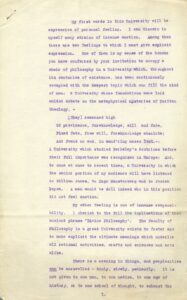Download the PDF of Whitehead’s first Harvard lecture here (click the thumbnail/link under “Files”).
Background and additional reading on Whitehead’s first Harvard lecture
Whitehead arrived in America on August 27, 1924, and delivered his first lecture in Harvard’s Emerson Hall about a month later, on September 25, at noon. It is not known whether he composed the lecture before or after his departure from England. It was Whitehead’s first lecture in the first class he had ever taught on philosophy, which appeared in Harvard’s course catalog as “Philosophy 3b: Philosophical Presuppositions of Science.”
Prior to the discovery of this manuscript, the Whitehead Research Project had published three sets of notes on Whitehead’s first year of Harvard lectures as The Harvard Lectures of Alfred North Whitehead, 1924–1925: Philosophical Presuppositions of Science (HL1), which included notes on this first lecture. A comparison of these notes with the manuscript reveals that Whitehead did not follow his manuscript exactly. For example, the notes record a reference to Spinoza, who is never mentioned in the manuscript, while an extended metaphor about a boy and his cricket ball in the manuscript does not show up anywhere in the notes (though it does show up in Whitehead’s lectures later in the year). It seems likely that Whitehead did not deliver roughly the last four pages of the manuscript, possibly due to time constraints.
Paul Bogaard, the editor of HL1, wrote an essay about what can be gleaned from the differences between this manuscript and the notes of his lectures, which appears both in Process Studies 48.2 and in the book Whitehead at Harvard, 1924–1925, an anthology of essays based on the 2017 WRP conference on the significance of HL1. Most of Whitehead’s original manuscripts have been lost to time, and we may owe the survival of this one to the fact that Whitehead at one point intended to include it in a collection of his essays that was never published. In fact, one of the only markings on the manuscript appears on the third page next to a paragraph in which Whitehead discusses his plans for the next lecture; he probably intended to delete this material for the version that would appear in the book.
Discussion questions
We discussed the following questions during this first meeting of the Whitehead Reading Group.
There is no recording of the session, but if you would like the Zoom chat log, you can email Joe Petek <jpetek@whiteheadresearch.org>, and he will send it to you.
1. At the end of a seminar in logic on February 25, 1927, Whitehead said that “Every scientific man in order to preserve his reputation has to say he dislikes metaphysics. What he means is he dislikes having his metaphysics criticized” (HL2, 375). How does Whitehead characterize the relationship of metaphysics and science in this first lecture?
2. Whitehead says on page 9 that “Without Scholastic Theology it is not likely that, so far as science is concerned, Western Europe would have surpassed Eastern China. It all depended on the habit of mind which came from a belief in an active rational God who attends personally to every detail.”First, what do you think of Whitehead’s idea that the belief in a rational God in the West laid the ground for the founding of modern science?Second, what resonances and/or tensions does Whitehead’s characterization of God—or the influence of the idea of God—have with his subsequent published writings?
3. The first few sentences of Lawrence Henderson’s book The Fitness of the Environment—which we know Whitehead read with interest before he arrived in America—read as follows: “Darwinian fitness is compounded of a mutual relationship between the organism and the environment. Of this, fitness of environment is quite as essential a component as the fitness which arises in the process of organic evolution; and in fundamental characteristics the actual environment is the fittest possible abode of life. Such is the thesis which the present volume seeks to establish” (Preface, page v). Do you see this statement reflected in Whitehead’s first Harvard lecture? In his books? How central (or not) is this idea in Whitehead’s philosophy?
4. On page 22, Whitehead says that both the “class-theory” and the “control-theory” present difficulties and philosophical advantages. How do you understand the difficulties and advantages of these theories in relation to the alternative that Whitehead is gesturing toward?
5. The logician Henry Sheffer, one of Whitehead’s new colleagues in the philosophy department, is said to have been heard muttering as he left Whitehead’s lecture that it was “Pure Bergsonianism!” What do you think was meant by this and do you agree?


